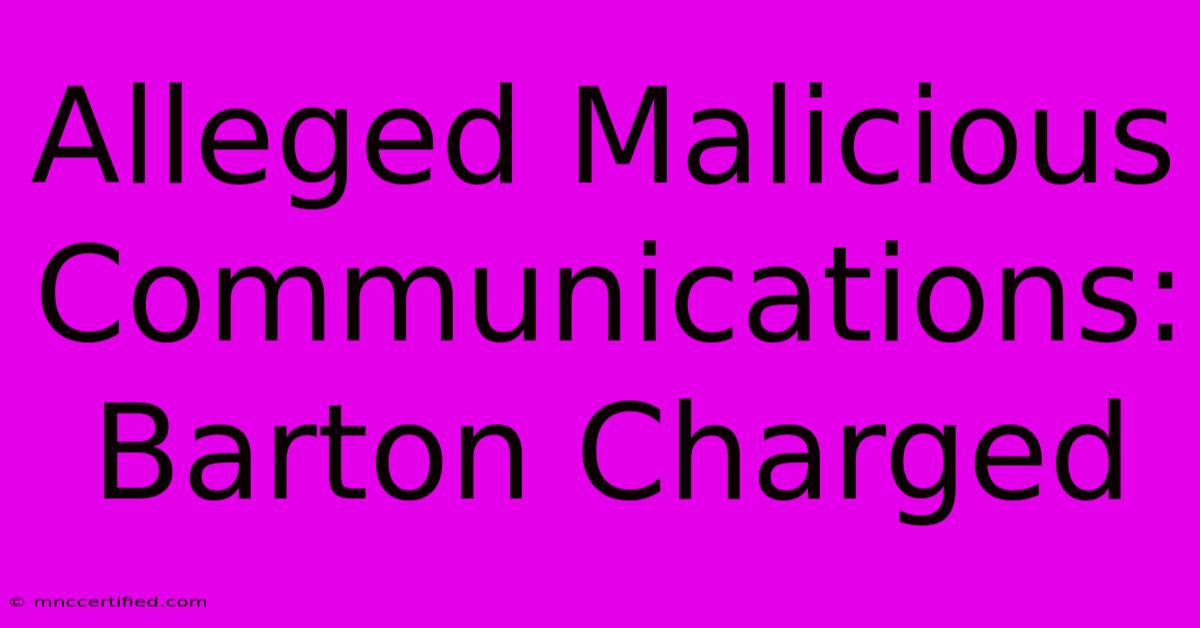Alleged Malicious Communications: Barton Charged

Table of Contents
Alleged Malicious Communications: Barton Charged – A Deep Dive into the Case
The recent charges against Mr. Barton for alleged malicious communications have sent shockwaves through the community and sparked intense public interest. This article will delve into the details of the case, exploring the accusations, legal ramifications, and the broader implications of online harassment and malicious communication. We will examine the specifics of the charges, the potential penalties, and the ongoing debate surrounding online safety and accountability.
Understanding the Charges Against Mr. Barton
Mr. Barton faces charges related to malicious communications, specifically focusing on allegations of online harassment and the dissemination of harmful content. The precise nature of the alleged malicious communications remains subject to ongoing legal proceedings, but reports suggest they involved a series of targeted online messages, potentially including threats, intimidation, and the spread of misinformation. The prosecution will need to prove beyond a reasonable doubt that Mr. Barton:
- Intended to cause distress or anxiety: The prosecution must demonstrate that Mr. Barton's actions were deliberate and aimed at causing emotional harm to the victim(s).
- Used electronic communication to convey the message: This element confirms the use of digital platforms – emails, social media, text messages – as the medium for the alleged malicious communications.
- The communications were of a malicious nature: This refers to the content itself – was it threatening, abusive, or designed to intimidate?
Legal Ramifications and Potential Penalties
The penalties for malicious communication convictions vary depending on the severity of the offense and the jurisdiction. Potential penalties for Mr. Barton could range from substantial fines to imprisonment. The specific sentencing will depend on factors such as:
- The nature and extent of the harm caused: Did the victim(s) suffer significant emotional distress, psychological damage, or even physical harm as a result of the communications?
- Mr. Barton's prior record: A history of similar offenses could result in a harsher sentence.
- The mitigating circumstances (if any): Were there any factors that might lessen the severity of the crime? This could include factors like mental health issues, though it's crucial to remember that these factors must be proven in court.
The Broader Context: Online Safety and Accountability
The Barton case highlights the growing challenge of online safety and the urgent need for increased accountability for malicious online behavior. The internet, while offering immense opportunities, also presents a platform for harassment, abuse, and the spread of harmful content. This case serves as a reminder of the need for:
- Stronger legislation: Laws need to be robust enough to effectively address the evolving nature of online malicious communications.
- Improved platform accountability: Social media companies and other online platforms must take greater responsibility for moderating content and protecting users from harassment.
- Increased public awareness: Educating individuals about the dangers of online harassment and the legal consequences of malicious communications is crucial.
Conclusion: The Ongoing Debate
The outcome of the Barton case will undoubtedly have significant implications for future cases involving alleged malicious communications. It underscores the critical need for a comprehensive approach to online safety, balancing freedom of speech with the protection of individuals from harmful online behavior. The case will be closely watched by legal professionals, online safety advocates, and the public at large, as it continues to unfold and shape the conversation surrounding online accountability. Further updates will be provided as the case progresses.

Thank you for visiting our website wich cover about Alleged Malicious Communications: Barton Charged. We hope the information provided has been useful to you. Feel free to contact us if you have any questions or need further assistance. See you next time and dont miss to bookmark.
Featured Posts
-
Wisconsin Tragedy Natalie Rupnows Role
Dec 18, 2024
-
Mudryk Drug Test Career In Jeopardy
Dec 18, 2024
-
Espn Mudryk Faces Football Ban
Dec 18, 2024
-
Rnli Crew Jordan Norths Tribute
Dec 18, 2024
-
Japan Automakers Eye Merger Honda Nissan
Dec 18, 2024